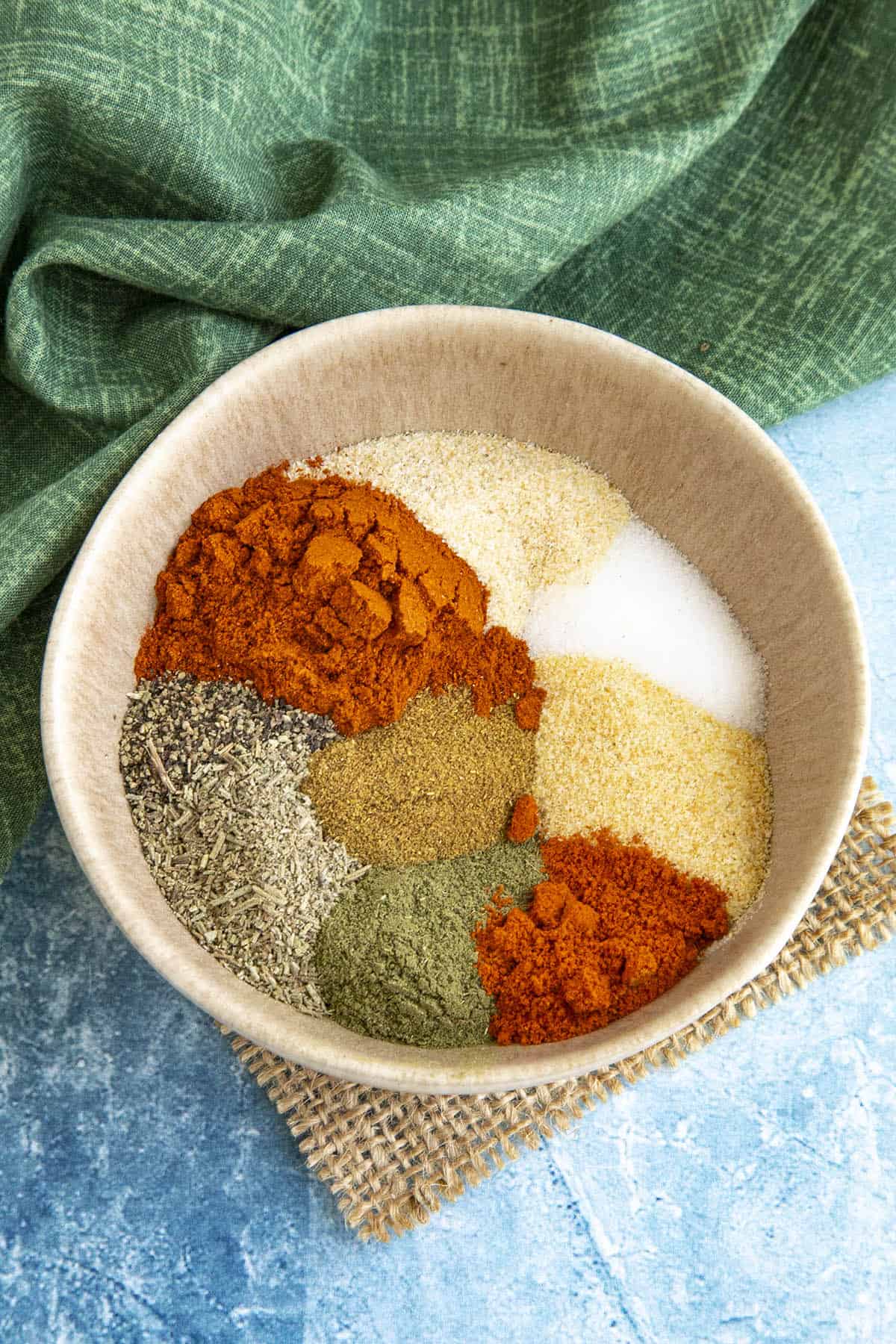This homemade turkey rub is the perfect turkey seasoning to give your bird lots of flavor, just mix, rub down the bird inside and out, and get cooking!
A turkey rub is a blend of herbs, spices, salt, and sometimes sugar that is rubbed onto the turkey to add flavor. A good turkey rub enhances the natural flavor of the turkey and creates a beautiful golden brown exterior when roasted. There are many recipes for homemade turkey rubs, but most include classic holiday spices.
Common Ingredients in Turkey Rubs
The most common ingredients found in turkey rub recipes include:
-
Kosher salt – Enhances flavor and keeps the turkey moist. Coarse grains stick to the skin better than table salt.
-
Brown sugar – Caramelizes to give a crispy skin. Molasses adds depth of flavor.
-
Pepper – Freshly ground black pepper has the most robust flavor.
-
Paprika – Adds rich color and mild sweet pepper flavor. Smoked paprika has a deeper flavor.
-
Onion powder – Provides onion flavor without the moisture of fresh onion.
-
Garlic powder – Imparts garlic taste without risk of burning
-
Herbs – Rosemary, thyme, sage impart traditional holiday notes.
-
Spices – Nutmeg, cinnamon, allspice, cloves provide warmth.
Customizing Your Turkey Rub
While classic herb and spice blends make excellent turkey rubs, you can customize them to your taste. Try adding citrus zest, ground ginger, cardamom, cayenne for heat, or swapping in different herbs. The possibilities are endless.
Stick with dried leafy herbs as fresh herbs may burn during roasting. Ground dried mushrooms or spices like ancho chile powder also work nicely.
Wet vs Dry Turkey Rubs
For roasted or baked turkeys, mixing the rub with butter or oil makes a compound butter or wet rub that helps the seasoning adhere. But for smoking or frying, go with a dry rub only to prevent burning.
If roasting, loosen the skin and apply some rub directly onto the meat before placing the rest on the skin. This technique ensures maximum flavor.
How Much Rub Per Pound of Turkey
Most recipes recommend 1-2 tablespoons of rub per 3 pounds of turkey. Adjust to your taste, keeping in mind that you can always add more but you can’t take it away. Apply the rub generously, inside the cavity as well as all over the skin.
Don’t be afraid to really work it into the skin with your hands, reaching the nooks and crannies.
When to Apply the Rub
For best results, coat the turkey with rub at least a few hours before cooking, even up to 24 hours in advance. This gives time for the salt and spices to penetrate deep into the meat, tenderizing it and enhancing juiciness.
If you’re short on time, seasoning right before roasting is fine. Just don’t apply too far in advance as the salt can start overly curing the turkey.
Suggested Side Dishes
A well-seasoned roast turkey deserves equally flavorful side dishes like garlic mashed potatoes, sausage stuffing, roasted Brussels sprouts, cranberry sauce, and flaky dinner rolls.
With a good turkey rub, you’ll have a show-stopping centerpiece entrée for your holiday meal. Guests will definitely go back for seconds!

Turkey Rub Recipe (Turkey Seasoning)
Are you ready to make the turkey, but need a good Turkey Seasoning blend? I have the perfect Turkey Rub right here!
If youre looking for the most flavorful turkey you can get this year, this is the ideal spice blend.
Its a great mix of savory spices and dried herbs, guaranteed to make your Thanksgiving turkey or holiday bird truly shine, whether you are making a roasted turkey breast, a whole turkey, or a wonderful meal of turkey legs or turkey wings.
I use this turkey seasoning rub with many turkey recipes, and we always love the resulting flavor.
Lets talk about how to make turkey seasoning, shall we?

The full ingredients list with measurements is listed in the printable recipe card at the bottom of the post.
- Salt. Typical table salt is good, or use kosher salt.
- Paprika. I like smoked paprika, though you can use sweet or hot.
- Onion Powder.
- Garlic Powder.
- Black Pepper.
- Dried Thyme.
- Dried Rosemary.
- Dried Sage.
- Cayenne Pepper. Optional, for spicy. Or use other hot chili powder.
Tools Used For This Recipe
As an Amazon Associate I earn from qualifying purchases.
My INCREDIBLE Smoked Turkey Rub | Backyard Test Kitchen
FAQ
What should I season my turkey with?
How do you get rub to stick to turkey?
Should I rub butter or oil on my turkey?
What is best to stuff a turkey with for flavor?
